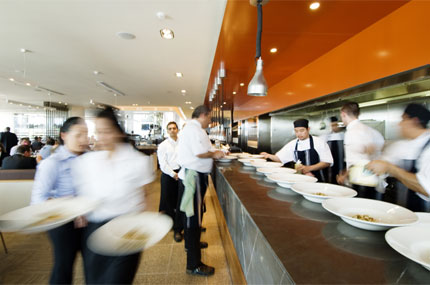
Who Owns Security in Your Restaurant?
A common definition of security is: “precautions taken to guard against crime, attack, sabotage, espionage, etc.” And for most of us, we often think of security in this way – as a thing or something we get, or even something we hire or buy. But consider another correct definition of security: “freedom from danger or risk – safety.” When viewed in this manner “security” is a state of being – a condition to be achieved and not something to be purchased or provided by another. The difference between the two definitions is in the assignment of the responsibility for security. It comes down to individual “ownership” of the issue. Do we entrust responsibility for our personal freedom from danger to another, or do we own it ourselves?
In most business environments we defer the responsibility of our personal security to others. Perhaps we relinquish our protection to the guard at the gate and never give it another thought. But in high-risk businesses we can ill afford to defer the responsibility of security beyond our own personal awareness. One such business is the restaurant business.
Restaurants are high-risk businesses and an obvious target
Restaurants are typically high volume, public-facing, cash businesses that sell alcohol, open early and close late. All are conditions that create risk and cause restaurants to become magnets for robbery, assault, theft, disturbances and other forms of crime. To complicate matters, no restaurateur wants to staff security personnel that results in a significant increase in costs and projects an image of the presence of danger – exactly the image that must be avoided with customers.
There is no better example of a business that can and must effectively create a state of security through collective ownership of the issue than the restaurant business. Ownership of security starts with creating a culture of security. Every employee participates and every employee owns the issue. A culture of security is created when management sets the expectation, creates effective policy and procedures, models the desired behavior, and holds staff accountable. Our culture describes who we are and the way we do our business. Creating a sense of security ensures that the processes to which we promote fosters a state of security awareness that is relentlessly adhered to without argument and without fail.
Here are 12 processes for effective restaurant security that are influenced by your security culture:
-
-
- Always open and close with at least two employees
- Never count money in public view
- Vary your banking routine
- Never discuss business volume, tips, sales or security procedure
- Never leave large amounts of cash on hand when closed and use a drop safe
- Always keep doors locked when closed and not staffed
- Count money out of public view
- Be alert to unusual or lurking behavior and search premises before closing
- Utilize a buddy escort system when leaving at night
- Check the exterior door viewer to check before going outside
- Never prop open doors in service areas
- Keep exterior service areas and parking areas well illuminated
-
Creating your culture of security will dramatically reduce the risk of security issues through effective procedures and practices. Both you and your employees will own the responsibility for your personal freedom from danger. Effective security begins with ownership.
Warm regards,
 Kathy Leodler Kathy LeodlerChief Executive Officer Email:kathy.l@rampartgroup.com Phone: (360) 981-2703 PI License #3555 |
 Paul Leodler Paul LeodlerExecutive Vice President Email:paul.l@rampartgroup.com Phone: (360) 981-3397 PI License #4180 |
We at Rampart Group are committed to your security. Call 1-800 421-0614 or contact us today with your security or investigative needs.
